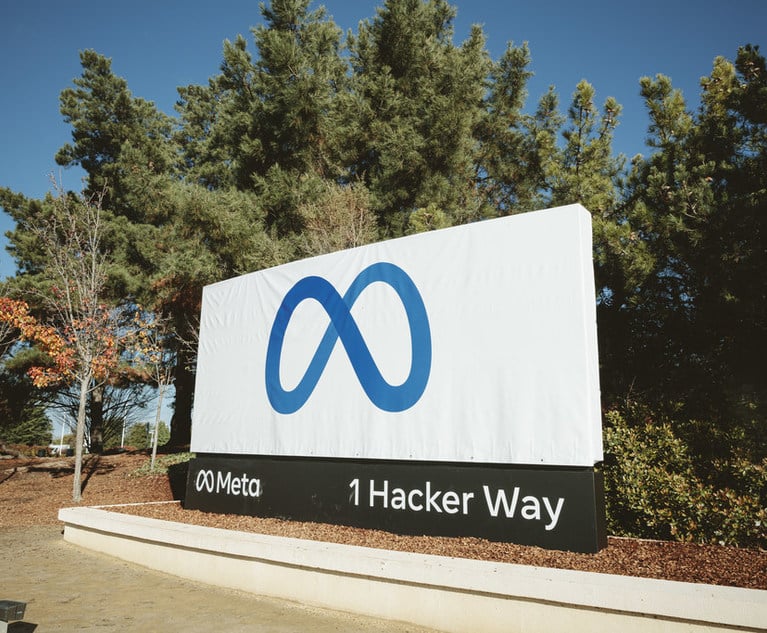A Look at the Data Issues Energy Industry Counsel Face this Year
As one of the longest standing segments in the global economy, the energy industry is deeply rooted in its processes and conventions. Aside from environmental…
March 27, 2018 at 04:21 PM
5 minute read

As one of the longest standing segments in the global economy, the energy industry is deeply rooted in its processes and conventions. Aside from environmental protection policies, it is not as regulated when compared with health care and financial services organizations. Without a regulatory strong arm forcing certain practices, the energy industry has felt less pressure to adjust to the emerging challenges of today's growing data volumes and new data privacy laws. Many operate in a culture that tends to be slow to adopt new approaches in the face of economic, legal and regulatory change.
Due to the above and other industry factors, counsel at oil and gas companies are often sitting on large volumes of information, which can be problematic for many reasons. Data hoarding presents challenges across data protection initiatives, electronic discovery activities for litigation and investigations, and importantly, compliance with Europe's General Data Protection Regulation (GDPR) and other global data privacy legislation. Further, energy companies are ripe for data breaches, and tend to face higher costs per data breach than the average corporation.
The Ponemon Institute's 2017 Cost of a Data Breach study found that the cost of a breach in the energy and utilities industry is estimated at $7.4 million per incident, a figure that is holding steady from previous years, while the global average rate across all industries dropped 10 percent from 2016 to 2017. Many organizations would view these figures with alarm, but energy companies have a unique perspective on risk. The cost of a single breach is relatively low stakes in comparison to the amount of money even small oil and gas companies are accustomed to spending for exploratory drilling. GDPR and other privacy, security and data breach laws on the horizon, however, will have more teeth than what the industry has experienced to date.
GDPR
Enforcement of the GDPR will go into effect in May of this year, and will impact all companies with a footprint in Europe. The law is broad sweeping, and states that organizations in breach of its extensive requirements may be fined up to four percent of annual global turnover, or €20 million (whichever is greater). International companies that deal in Europe need to comply with GDPR, whether they are storing information for employees, contractors, vendors or customers. Oil and gas companies will be impacted, and should be addressing GDPR head-on, assessing the full scope of regulated data that is housed within the company and what processes are already in place that may help or hinder compliance. Counsel must review requirements and applicability, and identify gaps and areas of risk across people, process and technology to develop a pragmatic roadmap and action plan.
There are many requirements that will require attention, and particularly for oil and gas companies, contract management is a key area that must be addressed. Privacy information, such as physical addresses and even Social Security Numbers, is often collected in oil and gas industry contracts, particularly those with individual contractors or private land owners for drilling sites. Organizations will be required to protect the privacy of that information and ensure it is not inappropriately shared or breached. Another consideration is the obligation for certain companies to appoint a Data Protection Officer (DPO). The 2017 General Counsel Up-at-Night Report from Morrison & Foerster and ALM Intelligence found that only 10 percent of respondents already have a DPO in place, while 74 percent indicated they do not have plans to appoint one to comply with GDPR.
Internal Threats
In recent years, the energy industry has started to address cybersecurity in response to external threats. However, internal threats, which are equally dangerous, have been less of a focus. The Ponemon study mentioned above found that more than 50 percent of data breaches were not caused by malicious or criminal attacks, but rather by internal system issues or human errors. Counsel must be aware of how internal leaks or information theft by employees will impact data protection and privacy efforts. Holistic information governance (IG) programs help ensure access management protocols and prevent sensitive information from walking out the front door. Data remediation initiatives are a key part of this and can include a variety of activities to bolster data protection.
Identifying what trade secrets the company has, understanding who has access to what data, and reasonably limiting access are important first steps. Policies should involve a sustainable tracking process for when employees change roles or locations, or leave the company and should include a mechanism to know what devices departing employees were using. Employee agreements and exit interviews are additional best practices. Defensible data disposal, wherein redundant, outdated and trivial (ROT) information is deleted from company archives and backups, will help reduce data volumes and the associated legal and regulatory risks of over-preserving as well as improve employee efficiency in the ability to locate and find trustworthy data.
There are of course justifiable reasons for why oil and gas companies default to data hoarding. Though attitudes are starting to change, some legacy preservation practices will remain. Whatever a company's decision is on what must be preserved and what can be disposed of, a sound IG program, rooted in privacy enablement and driven by counsel, will ensure the company can effectively protect sensitive data and comply with GDPR.
Deana Uhl is a senior director in the FTI Technology practice and is based in Houston. Uhl provides consulting to corporate clients, with a focus on designing, implementing and enabling change management for information governance, data privacy, data security and e-discovery programs. Uhl has particular expertise in advising oil and gas companies on the processes and technology to effectively address legal and regulatory matters and improve information quality and life cycle management to support operational excellence.
This content has been archived. It is available through our partners, LexisNexis® and Bloomberg Law.
To view this content, please continue to their sites.
Not a Lexis Subscriber?
Subscribe Now
Not a Bloomberg Law Subscriber?
Subscribe Now
NOT FOR REPRINT
© 2025 ALM Global, LLC, All Rights Reserved. Request academic re-use from www.copyright.com. All other uses, submit a request to [email protected]. For more information visit Asset & Logo Licensing.
You Might Like
View All
'A Prime Target': AT&T Hit With Class Action One Month After Disclosing Massive Data Leak



Trending Stories
- 1Lawsuit Against Major Food Brands Could Be Sign of Emerging Litigation Over Processed Foods
- 2Fellows LaBriola LLP is Pleased to Announce that Alisha Goel Has Become Associated with The Firm
- 3Law Firms Turn to 'Golden Handcuffs' to Rein In Partner Movement
- 4Friday Newspaper
- 5Public Notices/Calendars
Who Got The Work
J. Brugh Lower of Gibbons has entered an appearance for industrial equipment supplier Devco Corporation in a pending trademark infringement lawsuit. The suit, accusing the defendant of selling knock-off Graco products, was filed Dec. 18 in New Jersey District Court by Rivkin Radler on behalf of Graco Inc. and Graco Minnesota. The case, assigned to U.S. District Judge Zahid N. Quraishi, is 3:24-cv-11294, Graco Inc. et al v. Devco Corporation.
Who Got The Work
Rebecca Maller-Stein and Kent A. Yalowitz of Arnold & Porter Kaye Scholer have entered their appearances for Hanaco Venture Capital and its executives, Lior Prosor and David Frankel, in a pending securities lawsuit. The action, filed on Dec. 24 in New York Southern District Court by Zell, Aron & Co. on behalf of Goldeneye Advisors, accuses the defendants of negligently and fraudulently managing the plaintiff's $1 million investment. The case, assigned to U.S. District Judge Vernon S. Broderick, is 1:24-cv-09918, Goldeneye Advisors, LLC v. Hanaco Venture Capital, Ltd. et al.
Who Got The Work
Attorneys from A&O Shearman has stepped in as defense counsel for Toronto-Dominion Bank and other defendants in a pending securities class action. The suit, filed Dec. 11 in New York Southern District Court by Bleichmar Fonti & Auld, accuses the defendants of concealing the bank's 'pervasive' deficiencies in regards to its compliance with the Bank Secrecy Act and the quality of its anti-money laundering controls. The case, assigned to U.S. District Judge Arun Subramanian, is 1:24-cv-09445, Gonzalez v. The Toronto-Dominion Bank et al.
Who Got The Work
Crown Castle International, a Pennsylvania company providing shared communications infrastructure, has turned to Luke D. Wolf of Gordon Rees Scully Mansukhani to fend off a pending breach-of-contract lawsuit. The court action, filed Nov. 25 in Michigan Eastern District Court by Hooper Hathaway PC on behalf of The Town Residences LLC, accuses Crown Castle of failing to transfer approximately $30,000 in utility payments from T-Mobile in breach of a roof-top lease and assignment agreement. The case, assigned to U.S. District Judge Susan K. Declercq, is 2:24-cv-13131, The Town Residences LLC v. T-Mobile US, Inc. et al.
Who Got The Work
Wilfred P. Coronato and Daniel M. Schwartz of McCarter & English have stepped in as defense counsel to Electrolux Home Products Inc. in a pending product liability lawsuit. The court action, filed Nov. 26 in New York Eastern District Court by Poulos Lopiccolo PC and Nagel Rice LLP on behalf of David Stern, alleges that the defendant's refrigerators’ drawers and shelving repeatedly break and fall apart within months after purchase. The case, assigned to U.S. District Judge Joan M. Azrack, is 2:24-cv-08204, Stern v. Electrolux Home Products, Inc.
Featured Firms
Law Offices of Gary Martin Hays & Associates, P.C.
(470) 294-1674
Law Offices of Mark E. Salomone
(857) 444-6468
Smith & Hassler
(713) 739-1250






